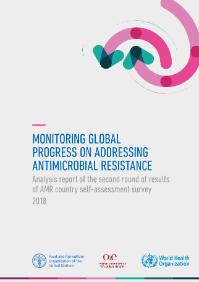
India’s drive on AMR: No results yet
At a time when India is battling with increased antimicrobial resistance (AMR) cases pushed by irrational use of antibiotics by healthcare practitioners and the uninformed public, a study published in

At a time when India is battling with increased antimicrobial resistance (AMR) cases pushed by irrational use of antibiotics by healthcare practitioners and the uninformed public, a study published in
<p>Antimicrobial resistance (AMR) is increasing in a wide range of pathogens, causing morbidity and mortality globally, and threatening modern medicine. While the long-term impact of AMR on human societies
<p>Over a 2-year period, from 2013 to 2014, WHO undertook an initial “country situation analysis” in order to determine the extent to which effective practices and structures to address antimicrobial
Antimicrobial resistance (AMR) can be described as the quintessential One Health issue: it involves humans, animals and the environment. It is also a multisectoral food safety problem whose effects transcend

Multinational companies continue to produce and sell unregulated antibiotics in India, worsening the problem of antimicrobial resistance in the country and impeding efforts to fight drug resistance globally,
Antimicrobial resistance is a serious threat to global public health that requires action across all government sectors and society and is driven by many interconnected factors. Single, isolated interventions
Antimicrobials (AM) play a critical role in the treatment of human and animal (aquatic and terrestrial) diseases, which has led to their widespread application and use. Antimicrobial resistance (AMR) is

Prasad also called for strong guidelines for the fast food chains in India so that the burning issue of health hazards by antimicrobial resistance (AMR) can be tackled. Director General of Health
<p>Antimicrobial resistance (AMR) is a priority for surveillance in bacterial infections. For leprosy, AMR has not been assessed because Mycobacterium leprae does not grow in vitro.<a href="http://www.indiaenvironmentportal.org.in/files/file/Antimicrobial-resistance-leprosy.pdf"

Countries are making significant steps in tackling antimicrobial resistance (AMR), but serious gaps remain and require urgent action, according to a report released by the Food and Agriculture Organization
In light of established principles and strategies for appropriate use of antimicrobial medicines, this paper examines studies on antimicrobial use trends across several countries in the Asia and Pacific
<p>Growing political attention to antimicrobial resistance (AMR) offers a rare opportunity for achieving meaningful action.<a href="http://www.indiaenvironmentportal.org.in/files/file/human-antimicrobial-use.pdf"
The global tripartite partnership calling for more responsible use of antibiotics in humans, animals and agriculture (including aquaculture and plant production) has announced it is widening its coverage
<p>Horizontal gene transfer has played a role in developing the global public health crisis of antimicrobial resistance (AMR). However, the dynamics of AMR transfer through bacterial populations and its
<p>To determine trends, mortality rates, and costs of antimicrobial resistance in invasive bacterial infections in hospitalized children, we analyzed data from Angkor Hospital for Children, Siem Reap,
The WHO/UNICEF JMP has expanded its global databases to include WASH in health care facilities. The 2019 global baseline report includes harmonized national estimates as well as regional and global estimates
The potential negative impact for human health of veterinary use of antimicrobials in prophylaxis, metaphylaxis and growth promotion in animal husbandry was first established in the 1960s and 1970s. Determination
<p>Typhoid is an important public health challenge for India, especially with the spread of antimicrobial resistance. The decision about whether to introduce a public vaccination programme needs to be
Antimicrobial resistance (AMR) – in which a microorganism (such as a bacterium, virus, fungus or parasite) becomes resistant to an antimicrobial drug used to treat infections caused by it – is possibly
<p>Unnecessary antibiotic prescribing contributes to antimicrobial resistance. In this trial, the aimed to reduce unnecessary prescriptions of antibiotics by general practitioners (GPs) in England.</p>